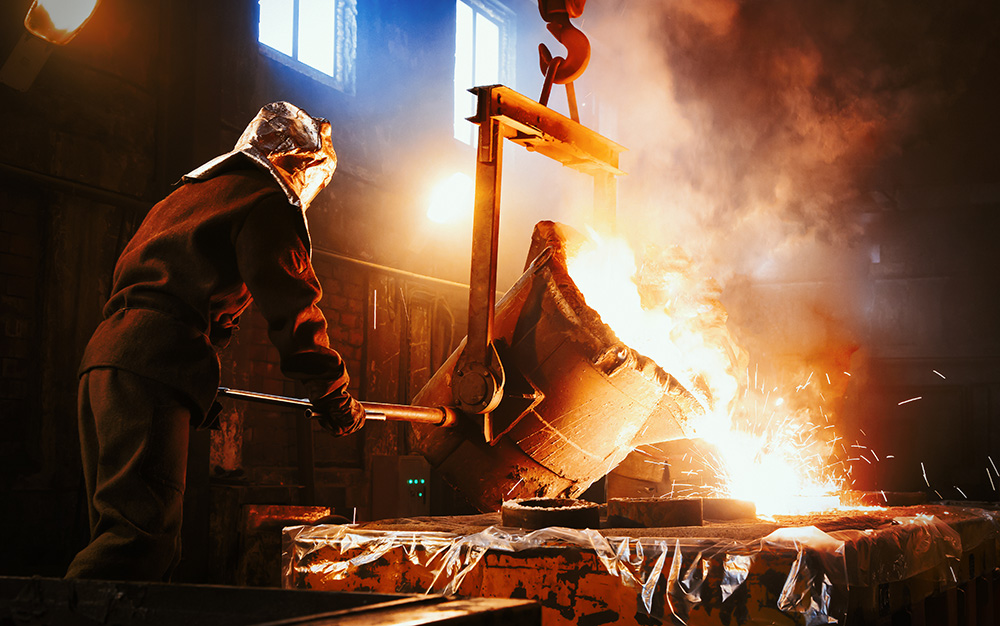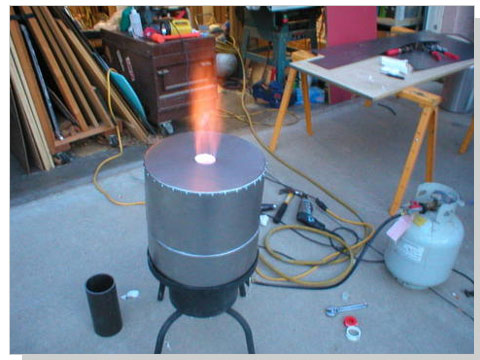Step-by-step tutorial to the Metal Casting process and its industrial applications
Just How a Metal Foundry Adds to Lasting Metal Manufacturing Practices
Metal foundries play an essential role in promoting sustainability within the metal manufacturing sector. By integrating recycled products, they lower dependence on virgin resources and minimize environmental effects. Energy-efficient melting processes additionally minimize energy usage and discharges. The journey toward sustainable methods includes even more than simply recycling and energy management. It includes a wider dedication to honest sourcing and innovative innovations. The implications of these practices are substantial and warrant closer examination.
The Duty of Recycling in Metal Foundries
While metal production has actually traditionally counted on virgin products, the enhancing focus on sustainability has actually led to a substantial shift in practices, especially in metal foundries. Recycling has actually become an important element of this improvement, allowing foundries to repurpose scrap metal and minimize dependence on mined sources. By incorporating recycled materials into their processes, foundries not only lower ecological impact yet additionally lower manufacturing prices.
Making use of recycled metals, such as copper, aluminum, and steel, lessens energy intake and lowers greenhouse gas discharges connected with conventional mining and refining techniques. Foundries can accomplish top notch outputs by using sophisticated sorting and processing innovations to ensure the purity of recycled materials. This focus on recycling fosters a round economic climate, where waste is lessened, and resources are utilized successfully. As a result, metal foundries play a critical function in promoting sustainable practices within the metal production market.
Energy-Efficient Melting Techniques
Energy-efficient melting strategies are essential for boosting sustainability in metal manufacturing. These methods considerably decrease power consumption throughout the melting procedure, which is just one of the most energy-intensive stages in metal production. Technologies such as induction melting, resistance home heating, and microwave melting offer boosted performance compared to traditional methods. Induction melting, for example, uses electro-magnetic fields to create heat directly within the metal, minimizing power loss and supplying accurate temperature control.
Furthermore, applying warmth healing systems can further boost performance by recycling and recording waste heat produced during melting. Employing sophisticated insulation products and optimizing heating system styles also add to energy savings. By taking on these cutting-edge melting methods, metal foundries can lower their carbon footprint, minimize operational expenses, and contribute to a more sustainable manufacturing landscape. The combination of energy-efficient methods not only aligns with environmental goals yet also meets the growing need for accountable production approaches in the metal industry.
Lasting Sourcing of Raw Materials
Sustainable sourcing of resources is important for lessening the environmental effect of metal production. This entails the boosted use of recycled steels, the fostering of ethical mining methods, and campaigns intended at neighborhood sourcing. By prioritizing these strategies, the sector can advertise accountable source administration and assistance neighborhood economic climates.

Recycled Metal Utilization
Just how can markets successfully minimize their environmental influence while meeting the growing need for metal? One substantial method is the application of recycled metal. By incorporating scrap metal right into their production processes, foundries can reduce the removal of virgin materials, therefore reducing and preserving natural resources energy consumption. Recycled steels call for much less energy to procedure contrasted to their raw equivalents, resulting in lower greenhouse gas emissions. Additionally, making use of recycled metal aids divert waste from land fills, promoting a circular economy. Industries that prioritize recycled metal not only add to sustainability however additionally gain from cost savings related to decreased product purchase. Recycled metal utilization stands as a vital approach for environmentally liable metal production.
Moral Mining Practices
While the demand for steels continues to climb, markets are increasingly identifying the value of ethical mining techniques in making certain liable sourcing of raw products. Honest mining incorporates a dedication to environmental stewardship, social duty, and adherence to fair labor methods. Companies are now prioritizing partnerships with mines that demonstrate openness in their procedures, lessening ecological impact and respecting regional neighborhoods. This strategy not only promotes a sustainable supply chain however additionally boosts the track record of services involved. By applying extensive criteria and qualifications, sectors can combat unlawful mining activities and advertise the welfare of workers. Eventually, ethical mining methods add significantly to a more sustainable metal manufacturing environment, straightening economic development with social and environmental stability.
Local Sourcing Initiatives

Innovations in Metal Casting Procedures
Developments in metal casting procedures are changing the industry by incorporating advanced recycling methods that lessen waste. Energy-efficient melting techniques are likewise being created to decrease energy consumption during production. Furthermore, the use of cutting-edge mold products contributes to improved efficiency and sustainability in casting procedures.
Advanced Recycling Techniques
Advanced recycling strategies are changing metal casting procedures, greatly improving sustainability in the market. These advancements focus on recycling and redeeming scrap metal, considerably lowering waste and the demand for virgin materials. Strategies such as hydrometallurgy and pyrometallurgy enable foundries to draw out important metals from utilized parts, making sure reliable source use. In addition, progressed sorting and purification technologies enhance the top quality of recycled metals, making them ideal for high-performance applications. This not just decreases the ecological footprint of metal manufacturing yet likewise promotes a circular economic situation by promoting the reuse of products. As these reusing methods remain to evolve, they promise to better simplify operations within foundries and add to a more sustainable metal manufacturing landscape.
Energy-Efficient Melting Approaches
While typical melting techniques have actually long been the backbone of metal casting, recent innovations have presented energy-efficient methods that markedly lower energy intake and emissions. Technologies such as induction melting and electrical arc heaters have actually obtained prestige, allowing for precise control over temperature level and lowering the demand for fossil gas. These techniques not just boost energy efficiency but additionally advertise faster melting times, which equates to decrease functional prices. Additionally, advancements in heat recuperation systems enable foundries to record and recycle excess warm created during the melting process. This all natural approach to power administration not just supports sustainable methods but likewise positions metal foundries as leaders in the change in the direction of greener manufacturing procedures, even more aligning with international sustainability goals.
Innovative Mold Products
As the need for even more reliable and lasting metal casting procedures expands, the exploration of innovative mold materials has come to be a prime focus in the sector. Conventional mold materials commonly add to environmental difficulties, triggering the look for options that lower waste and energy consumption. Recent innovations consist of the growth of recyclable composites and biodegradable binders, which not only enhance mold and mildew performance but additionally lessen ecological effect. Furthermore, using 3D printing modern technology in mold production enables detailed layouts that minimize product usage and enable fast prototyping. These cutting-edge materials not resource just enhance casting accuracy yet additionally line up with sustainability objectives, showcasing the sector's commitment to lowering its carbon footprint while keeping top notch production standards.
Lowering Waste Through Advanced Innovation
Ingenious modern technologies are transforming the metal manufacturing market by greatly minimizing waste and improving effectiveness. Advanced information analytics and artificial intelligence formulas allow foundries to enhance manufacturing processes, reducing and identifying ineffectiveness scrap material. Smart sensors check equipment performance in real-time, enabling for anticipating maintenance that decreases downtime and waste generation. Additionally, additive production strategies, such as 3D printing, enable the production of complicated parts with minimal material use, substantially reducing waste compared to traditional approaches.
Closed-loop systems are becoming much more widespread, in which scrap metal and byproducts are reused back right into the manufacturing cycle, ensuring that materials are made use of to their maximum potential. This assimilation of modern technology not only advertises source conservation yet additionally improves the overall sustainability of metal manufacturing techniques. By accepting these innovations, foundries can contribute to a much more lasting future while preserving competitiveness on the market
The Influence of Foundries on Carbon Footprint Decrease
Foundries play an important role in reducing the carbon impact of the metal manufacturing sector by executing various sustainable practices. By making use of energy-efficient technologies, such as electrical arc furnaces, these centers significantly lower greenhouse gas emissions compared to conventional techniques. In addition, foundries progressively adopt renewable resource sources, which likewise decreases their dependence on fossil gas.
Reusing scrap metal is another critical practice that foundries use, conserving resources and decreasing the need for virgin materials. This not only decreases waste yet also minimizes the energy-intensive removal procedures related to mining. The adoption of closed-loop water systems assists to reduce water usage and lower wastewater discharge, adding to an extra lasting procedure.
With these campaigns, foundries demonstrate their dedication to environmental stewardship, resulting in a significant decrease in the general carbon footprint of the metal production sector. Their continuous initiatives are pivotal in the shift towards a much more lasting industrial landscape.
Frequently Asked Questions
What Types of Metals Are Many Typically Recycled in Foundries?
Aluminum, steel, copper, and brass are amongst one of the most generally recycled steels in foundries. These steels are preferred because of their high recycling prices, financial worth, and prevalent availability, contributing substantially to commercial sustainability initiatives.
Exactly How Do Foundries Make Certain the Quality of Recycled Materials?
Foundries determine the quality of recycled products via rigorous testing, sorting, and filtration procedures. They apply innovative innovations to evaluate structure and remove impurities, assuring that the recycled metals satisfy industry standards for performance and security.
What Qualifications Exist for Lasting Foundry Practices?
Various certifications exist for sustainable foundry methods, consisting of ISO 14001 for ecological management, ISO 50001 for power monitoring, and LEED certification for sustainable building practices (Aluminum Casting). These qualifications aid guarantee adherence to environmental and sustainability standards in operations
Just How Do Foundries Measure Their Carbon Footprint Decrease?
Foundries my company measure carbon footprint decrease via tools like lifecycle evaluations, power audits, and discharges tracking systems. They compare baseline emissions to present results, evaluating enhancements in power efficiency, product usage, and renewable power adoption over time.
What Are the Financial Advantages of Lasting Metal Manufacturing?
Lasting metal production supplies financial advantages such as minimized operational prices, boosted efficiency, boosted market competitiveness, and possible federal government motivations. In addition, it fosters advancement and draws in ecologically conscious consumers, eventually driving long-lasting success for services.
Metal foundries play an important role in promoting sustainability within the metal production industry. While metal manufacturing has actually traditionally counted on virgin materials, the raising emphasis on sustainability has led to a considerable change in methods, particularly in metal foundries. By including scrap metal right into their production procedures, foundries can reduce the removal of virgin materials, consequently lowering and conserving natural sources energy consumption. Foundries play a crucial duty in minimizing the carbon footprint of the metal manufacturing industry web by executing different lasting methods. Reusing scrap metal is another vital practice that foundries employ, conserving sources and decreasing the need for virgin materials.